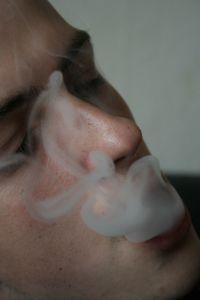 Insomnia is one of the many disturbing side-effects of smoking. If you are already having problems trying to nod off, smoking will only make them worse. It is a fact that smoking and sleep problems go hand in hand.
Insomnia is one of the many disturbing side-effects of smoking. If you are already having problems trying to nod off, smoking will only make them worse. It is a fact that smoking and sleep problems go hand in hand.
Nicotine is the Culprit
Cigarettes contain the stimulant nicotine, which can keep you awake and alert, interrupting sleep. Smoking can give you a ‘high’, but the body adjusts to nicotine quickly, so you need to smoke more and more to get the ‘high’. If you don’t smoke enough, nicotine withdrawal symptoms can make you edgy and bad-tempered.
One’s nicotine craving can happen any time during the day or night. If it occurs at night, it affects sleep, which can have an undesirable effect the following day. Lack of sleep makes you tired, irritable and also impacts concentration. This can turn into a vicious circle. You smoke at night, thinking it will put you to sleep. But, the nicotine only stimulates you and interrupts your sleep, resulting in tiredness during the next day.
Smoking does not Relax
Many smokers think cigarettes help them to relax, besides making them look cool in a social milieu. However, instead of relaxing, cigarettes energize them. When combined with alcohol, nicotine increases the blood pressure and heart rate, which elates the smoker.
Smoking also leads to ‘smoker’s cough’, which affects sleep at night. When combined with coffee before bedtime, smoking can have a debilitating effect on sleep, as caffeine and nicotine can both act in combination to give you a sleepless night. Try to replace nicotine with something healthy such as a massage or herbal tea.
Withdrawal Symptoms are Temporary
There are many causes for sleep problems such as work patterns, stress, snoring and caffeine. But, if you are a regular smoker, nicotine is surely a cause for your insomnia. If you try to stop smoking, the withdrawal symptoms may affect your sleep. But, this is a temporary phenomenon which usually disappears in a few weeks. So, do not be disheartened.
Ways to Quit Smoking
We list a few tried and tested methods to quit smoking:
- Exercises such as swimming or walking help to minimize nicotine cravings.
- Deal with withdrawal symptoms by chewing gum or using nicotine patches.
- Call a helpline or support group, and take encouragement from family and friends.
- Try acupuncture for help.
- Get professional help from established practitioners.
1 Comment
hi,for years i have been smoking on the weekend.and not bothered during the week.i have suffered with insomnia for years,strangely enough only thurs/fridays.this ties in perfect with what i ve been reading about peak withdrawal time of 3-5 days.i would smoke up to 30 cigarettes on the weekend.i have since quit for good and seem to be sleeping ok(touch wood).could you tell me if this is co incedence or have i cracked it??